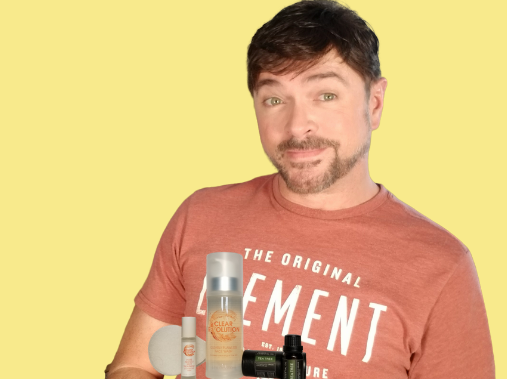Understanding Your Skin Type with Chris Gibson
Do you know your skin type? Chris Gibson shares his expertise into how to know and how to care for your type!
Listen to us On
About the Episode
LifeBlood: We talked about how to understand your skin type, why it matters, which products to use and which to avoid, and how to develop a healthy and affordable protocol, with Chris Gibson, SkinCare expert, Holistic Health Coach and YouTuber.
Listen to learn the long-term benefits of consistent skin care!
You can learn more about Chris at ChrisGibsonLive.com, Facebook, Twitter, Instagram, YouTube and LinkedIn.
Thanks, as always for listening! If you got some value and enjoyed the show, please leave us a review wherever you listen and subscribe as well.
You can learn more about us at LifeBlood.Live, Twitter, LinkedIn, Instagram, YouTube and Facebook or you’d like to be a guest on the show, contact us at contact@LifeBlood.Live.

George Grombacher
Lifeblood Host

Chris Gibson
Guest
Episode Transcript
Come on
we’re leopard. This is George G. And the time is right. Welcome. Today’s guest is strong, the powerful Chris Gibson. Chris, are you ready to do this? Yeah, sure I am. Alright, let’s let’s go. Chris is a sought after skincare expert and holistic health coach and aesthetician. He’s a best selling author of Acne Free In three days excited to have you on. Chris, tell us a little about your personal life more about your work and why you do what you do.
Chris Gibson 0:39
Oh, well, that’s okay, I’ll try to get a thumbnail version of it. Um, I help people really the focus now at skincare. But I also do talk to people about nutrition, because they all interplay, fitness, all of those things play together to create, you know, your experience, your physical experience. So, but what I’m most known for is skincare, because I focused a book, about 15 minutes spent 15 years ago on acne and what I went through to cure it myself, because I wasn’t being able to do that through the standard ways of medications, or antibiotics or any of that. So I wrote a little booklet on what I did not how to do it, but what I did, and the book sort of became a touchstone for a lot of people that were struggling. So it evolved television with that. Not really wasn’t my life plan.
To for that to go that way. But it did, which was fine. I helped a lot of people. And then, you know, long story short, I dove into YouTube in 2018, because I didn’t really want to go back on television. And on the road, I had done that for so long. I enjoy live TV, but it’s, you know, five o’clock calls and all that stuff. That was it was hard. So YouTube has done really well for me, but the focus is kind of evolved to really about skincare and solving problems for people in their 30s 40s 50s and over skin issues that aren’t responding to traditional, that’s my holistic background and aesthetician background. But also understanding what is in skincare, how it affects your health, how your diet impacts your skin and your fitness, in fact, impact your skin. So as I said, that’s sort of so I spend most of my time focused on YouTube. I’m constantly added, I have a blog that’s very active, it’s interactive, where people ask me questions. Because I don’t have a practice, I don’t do any of that stuff anymore. So it’s really very passion oriented for me to help folks and help them understand the conundrum of skincare, because there’s so much of it. So many different brands, should I buy the celebrity branch? Is it worth it? Or is it just about ingredients and, and so really, that’s been my focus, and that’s pretty much my life right now. So
george grombacher 3:06
I appreciate that. The conundrum of skincare, our skin is very important to us. So I would like to have nice skin. But if I do not currently have the skin that I want, what in the world do I do?
Chris Gibson 3:21
Well, the first is understanding, you know, taking a look at what your specific issues are, is it photo aging, because you didn’t wear sunscreen? Or you did a lot of tanning back in the day? Or is it you know, issues with dryness or it really comes down to your skin type and what your specific issues are, understanding what those are first, and then not getting frustrated because there are a myriad of ways to approach every individual skincare issue in person. And everybody’s a little bit different. Some things work for some people that don’t work for others. So there’s a lot of trial and error and patients involved. So the first thing I would say is if you have something that you’re trying to deal with, and you’re not getting anywhere, no matter what you try, you know a trip to the dermatologist or a a you know, licensed aesthetician is probably a good starting point. Because it gives me very first thing skin also can foretell other health issues. Getting your largest organ and oftentimes the health of it or the state of it, so to speak, can be associated with things like diabetes, it can be skin cancer, it could be you know, anything like that dryness can be tied to kidney issues, liver issues, so sometimes your skin’s usually really responsive unless there’s something deeper going on. And if that’s the case, then I think professionals dipping in it’s not it’s worth the two or 300 bucks if you can come up with it. To just go in and get checked out. Is the First step, I would say, for that
george grombacher 5:04
fascinating when you’re talking, I thought, what came into my mind was that skin is like the canary in the coal mine. If I’m having other underlying issues, it’s going to show up, certainly probably in other parts of my body and my health, but also my skin.
Chris Gibson 5:19
Right? Yeah, I mean, you know, it’s just like they can take, they can take a drop of blood now and tell you pretty much what the hell’s going on with you. On. We don’t do that in the home yet. I’m not sure that won’t happen at some point where there’ll be some kit that we just do that. But yeah, your skin’s gonna tell you a lot of things about the environment you’re in, you know, this time of year for a lot of people. Northern Hemisphere, it’s cold, it’s dry. So a lot more skin issues I hear from a lot of folks. And people slap on moisturizers, and they’re like, why isn’t that working? Well, there’s two things at play when your moisture level obviously is important. But you have what’s called a lipid layer or lipid barrier. And a lot of times in the winter time, those fats are not produced as much the skin doesn’t produce as much of them. And it can dry out the lipid barrier actually helps trap moisture and protect your skin from the outside environment. So if you have heated homes with very dry air, then you’re out in the winter air is very dry. People won’t find relief so much in a moisturizers they will ceramide cream, which is like the Cerave. Moisturizing carrying something that has those lipids, those fatty acids in there to go back on the skin and help build that layer back up is going to be more helpful than just say slapping on some body lotion. So it’s really it’s kind of you kind of have to do some thought process there about what’s going on with you and your environment, maybe you need to humidify it. I’m suffering the effects of dry air right now myself, my sound scratchy. Even in Florida, it gets dry in the winter time. So yeah, so it’s really that and then really looking at your diet, you know how much sugar you consume. If it’s a lot, you might want to look at that making sure you have leafy green vegetables, what supplementation is also very important for most people. Vitamin K two is a really big deal right now. It’s been a big deal. But it’s gotten more press, which is good because it’s a nutrient that’s hard to get. We often hear about vitamin K one, Vitamin K two is a little bit different in the way it reacts in the body, it helps move the calcium around correctly, get it to the right place where it doesn’t build up in your arteries, but it gets it to the cells and the membranes in your brain and your skin. So oftentimes that supplements necessary, plus a d3. This is kind of why it’s good to seek out somebody that really has a good background in all of this and can help guide you with that, because that’s something a lot of people just don’t even know about. And yet, Vitamin K to supplementation for most people over 30 can make a huge difference in the health of their skin, it can prevent wrinkles, and it can prevent the breakdown of collagen, which is what makes our skin sag and look older. And bone loss, which is a big thing as we get older, which makes us our skin our face look different. So there’s a lot of things like that out there that can be helpful if you know about them. And that’s not something you know, unless you catch the article or something happens in the news. Most people don’t know about that. So I always say again, it’s good to just seek out somebody even if it’s an online resource that’s trusted and licensed and there’s tons of us out there. Oftentimes just reading through the blog material, you’re gonna learn a whole lot of stuff about what you can do for your skin. Nice that’s cost you anything, you know,
george grombacher 8:44
yeah, I appreciate that. So your thoughts on on, I don’t want to call them supplements but skincare products. When buying off the shelf and then looking for more homeopathic or natural products.
Chris Gibson 9:02
Sure it’s easier to talk about what to stay away from. There are a lot of great ingredients out there. Vitamin C serums are good for your skin rotten all moisturizers are good for your skin. Again serve ice cream we just spoke of that sunscreen of course is super important. Knowing what your particular facewash for your skin type is right for you. If you have oily skin usually a foaming clarifying cleanser clear when will be the choice that helps you out the most if you have dried normal skin using the creamy type. So really getting that basic routine down just those items that I just talked about it staying away things from things like denatured alcohol, which will be on the back of the label, any kind of parabens which we’re seeing less and less of that sulfates sulfides ureas can also be irritating to skin fragrance. The FDA doesn’t require companies to To tell you what the fragrance is made out of. So unless that particular skincare line took the time to list that out, which most don’t that just say fragrance, you can assume it’s synthetic. If you have sensitive skin, that can be a problem for extra dryness and also irritation. So I always recommend people in general, stay away from fragrance products unless you’ve had a history with that product and it hasn’t bothered you, then it’s fine. It’s not harmful for everybody. But if people have sensitive skin, oftentimes fragrances an issue, also be sure that you patch test in any product. Even if it’s something that has similar ingredients to something used before a patch test on the inner elbow. Based on whatever the skincare product is supposed to do, whether that is beyond ongoing. Or it’s a wash off like a mask, you want to you want to follow those instructions on the inner elbow, and make sure you don’t have a reaction if we put it on your face. Smart. And then. And then the other big thing that I talked to people about is making sure they they get everything your face, your ears, your neck, the back of your neck, your upper chest, your tops, or your arms and hands, anything is generally exposed to the elements needs help from your skincare routine. So it’s not just about face, we see people today that back in their 30s and 40s really paid attention to their face, but nothing else. So their face looks really great, their skin looks really healthy. But then they have a lot of sun aging or photo aging other places. So I try to help people prevent that, because it’s much easier to prevent it, then reverse it. So yeah, treating all of those areas is very, very important. Especially with sunscreen, so
george grombacher 11:40
nice. How many different skin types are there?
Chris Gibson 11:43
Well, the, when you look at the commercial skincare companies are usually three, maybe four, it’ll be oily, dry, too sensitive, they’ll put those two together, sometimes you rather stick oily sensitive products, but there are really about eight of them. On my blog, I’ve broken it down into eight because a person can have super oily skin, but get very sensitive skin that’s not acne prone, or you can have oily skin that is acne prone. You could have dry skin that is acne prone. So there’s a lot of differentiation and that and those products that are generally labeled for like acne, are going to be too harsh for people with sensitive dry skin, even if they’re getting breakouts going to create more of a problem than help. So you can use the D generic guide of oily, normal, dry and sensitive. That’s the four names getting types that things are labeled for but really knowing your ingredients. Again, staying away from like alcohols and sulfates. If you have dry skin, you don’t want that you want surmise, you want to build up the lipid layer? So it really it’s just a great question. Because there’s probably more than that. I mean, there’s probably you could probably come up with like 12 of them if you really wanted to. So as I said for a lot of people’s a lot of trial and error that goes on in trying to find a product that works for them. And the other thing that I tell folks is to have patience with products and your skin because skin takes time. For most almost I just did a video on this, what ingredients give you somewhat instant results, something you’re going to see in a day or two. versus what’s going to take a lot more time for you to see results from so things that work on the deeper layers of the skin like collagen, like your retinols, your vitamin C serums, your spa correctors skincare acids, they’re going to take a number of weeks to months for you to see the results. So you have to be patient and very consistent. The skin takes for a 20 year old it takes a month for your cells on the surface of your skin to be replaced as you get older takes longer. Sometimes you have six weeks, eight weeks, it depends on your, your genetic makeup, but generally be any kind of retinol product or light therapy product that’s building collagen for that to actually start to show up. But it does work because I test those things out and it’s pretty amazing. Two to three months out when you start to really see the effects of that thickening of the skin where we see the plumper skin, less wrinkles, less sagging, and they haven’t had to have any sort of surgery. So it’s pretty, pretty phenomenal that people can stick with it.
george grombacher 14:33
How hard is it for me to figure out what my skin type is?
Chris Gibson 14:37
Uh, not terribly hard. I mean it’s you know you need to look at normal skin is going to be oily around the T zone and drier towards the edges. So normal skin type is going to taller if you’re not don’t break out easily and things don’t irritate your skin easily. That’s a normal that’s a call that normal If you have oily skin and you find that you wash your cleanser skin and it gets makes it Euler, you probably have an issue with your face wash you need to change it. But that’s an oily skin type. If you apply things to your skin and it’s oily and you break out you have acne prone skin so it’s really just looking at how your skin behaves, when you do things to it will tell you what your skin type is what all skin types are, are in need of sun protection. I harp on that a lot. It doesn’t matter how dark your skin complexion is you need to be protecting it from the rays of the sun because they do damage below the surface of the skin. So people think of sunscreen as just protecting the outside it’s not really doing that it’s protecting those long wave rays keeping those from getting down into the collagen lower layers of your skin where it can do the most damage cause skin cancer, cancer cells DNA damage in the cell and lead to photo aging. So all of that stuff starts deeper under the skin than people think. So some protection Big Deal offer everybody
george grombacher 16:02
got it nice. I appreciate that. I imagine that would be pretty easy. If I really got invested in this and interested in it for me to all of a sudden develop $100 hundreds of dollars a month skincare regimen. And that’s not something that I’m personally interested in Chris maybe it should be but for somebody like me who wants to have nice skin but I don’t want to spend a ton of money on it. Are there certain things I should really be thinking about?
Chris Gibson 16:31
Yeah, I tell people that are there just a few basic things you need and drugstore brands are just as effective often as the more expensive brands. You know celebrity brands are going to have a name attached to them so you’ll be paying for packaging in the name on that particular product. Basically a person needs besides a good facewash which we just talked about a good Vitamin C Serum they can be gotten from that can be procured from someplace like the ordinary for like eight bucks. Some of these vitamin C serums out there run 150 bucks or higher. So look at your drugstore brands like Sarah V has two great retinols I always tell people Retinol is still the king topical for anti aging we have not replaced it with anything else. The prescription brand is retina a which everybody’s probably recognize tretinoin but starting with a drugstore versions like a Sarah V, or even the ordinary or good molecules, those brands are going to have those things for just you know 10 Maybe $15 at the most. A good moisturizer. Neutrogena is a great brand been around for a long time. They’re more moisturizer in the last two months, it’s a water cream. Good for all skin types. It’s fragrance free. They have a body lotion out now to hyaluronic acid, very important, moisturizing ingredient that we all should be using. Yeah, 15 bucks. So you can for you know, about 50 bucks a month, maybe a little bit less than that. Have a solid routine going without having to spend tons of money on products not to do that.
george grombacher 18:13
Awesome. Appreciate it. Chris, the people are ready for your difference making tip even though you’ve given us a lot, what do you have for them?
Chris Gibson 18:20
Well, I would take all of this. And for the person who is like you are interested in this is to start is to take start taking the steps whether that starting with just a vitamin C serum, seeing how it impact your skin is sort of like weight loss. Once you start to see results in a change, you get more motivated to do more. So yeah, basically, it’s just get started and be very consistent, because that’s the issue that I run in with most people just like everything. That consistency is such a key along with the patience. So really though it’s getting started and then being very consistent so you can get some results.
george grombacher 19:00
I think that is great stuff that definitely gets Come on. Chris, thank you so much for coming on. Where can people learn more about you? And where can we check you out on YouTube?
Chris Gibson 19:10
Yeah, YouTube, it’s easy. It’s you can type in Chris Gibson or Chris Gibson lies the name of the channel, but doesn’t matter anymore. You just type in my name, I’ll pop up. And then of course, I have my interactive blog, which is really a network where people can talk to each other, they can question some questions directly to me, which is easier than YouTube because I don’t always get to all the comments. There’s like 120,000 subscribers there so I don’t see everything. That skin so fabulous. You can just type that into Google search bar. It’ll be the number one thing and then you can it’s free. It’s a free resource. You can find out your skin type there just like we were talking about the eight that I have created. So that’s really the two best ways and then all my social media all of my contact information is always in every video and it’s also on the blog so I’m not hard to find.
george grombacher 19:58
Love it. Well, if you enjoyed this as much as I did show, Chris your appreciation and share today’s show with a friend who also appreciates good ideas, find Chris on YouTube, just type in Chris Gibson, and everything will come up and then search for skin so fabulous and figure out what your skin type is. And stay in touch with Chris and figure out what your routine is and be patient and consistent with it. Thanks. Good, Chris. All right. And until next time, keep fighting the good fight as we’re all in this together.
Transcribed by https://otter.ai
More Episodes
Morning Routine Checklist
The value in having a morning routine checklist If I had a lifetime checklist, living intentionally would be at the top. Having checklists for things is a means of doing that. I like to get up early because there’s not a lot of other people that do. It...
Debt Free: Get Back to Living
The time is now for putting a plan together to become debt free. I’m going to talk about how and why the implications are far greater than you realize. Life is short, and it’s important to live in the present as much as we can. But it’s also very...
Creating Your Wellness Checklist: Steps to a Better Life
Creating a wellness checklist can help you bridge the gap between the life you have and the life you want. I’m going to talk about how to create a wellness checklist, as well as help you fit it into your busy life and make it sustainable. Why bother with...
What States Don’t Tax Retirement Income and How Do I Create More Tax Free Income
There are seven states with no income tax, meaning these seven states don’t tax retirement income AlaskaFloridaNevadaSouth DakotaTexasWashingtonWyoming Why is this important? Because, depending on the type of account(s) you're using to accumulate money for your...
How Much Money Should I Save Before Buying a House and How Do I Do It?
How much money should you save before buying a house? A down payment of 20% and six months worth of what your expenses will be once you own the home. Here’s what I’ll cover in the remainder of this post Why you should save that muchThe cost of making a bad...
Rental Property Loans: What You Need to Know to Position Yourself for Success
Rental properties can be a great way to diversify your income and your long-term financial situation. Understanding rental property loans and how to qualify will position you for success as you set out on your passive income journey. No doubt you have...
How to Become Debt Free Using Goals Based Budgeting
Debt has become an insidious part of many of our lives. I’m going to share with you a process for becoming debt free using goals-based-budgeting so you can start living the life you truly want. There are many reasons why people fall into debt. There are many...
How to Get Good with Money: 7 Steps to Financial Prosperity
I’m excited you’re interested in how to get good with money and I’m confident I can help you get where you want to go. This article will go through 7 steps to help you achieve financial prosperity. It’s not enough to know about money. It’s not enough to...
Goal Setting for your Future Self: Why it’s a Good Idea and How to Do it
To develop empathy for another, we’re told to walk a mile in their shoes. But how do we do this for ourselves? It’s hard for us to imagine our future-selves. To think of ourselves as getting older and one day dying. It’s for this reason we have a difficult time with...
Join the show.
Interested in being on the show? Tell me a little bit more about you and what you’d like to talk about!














